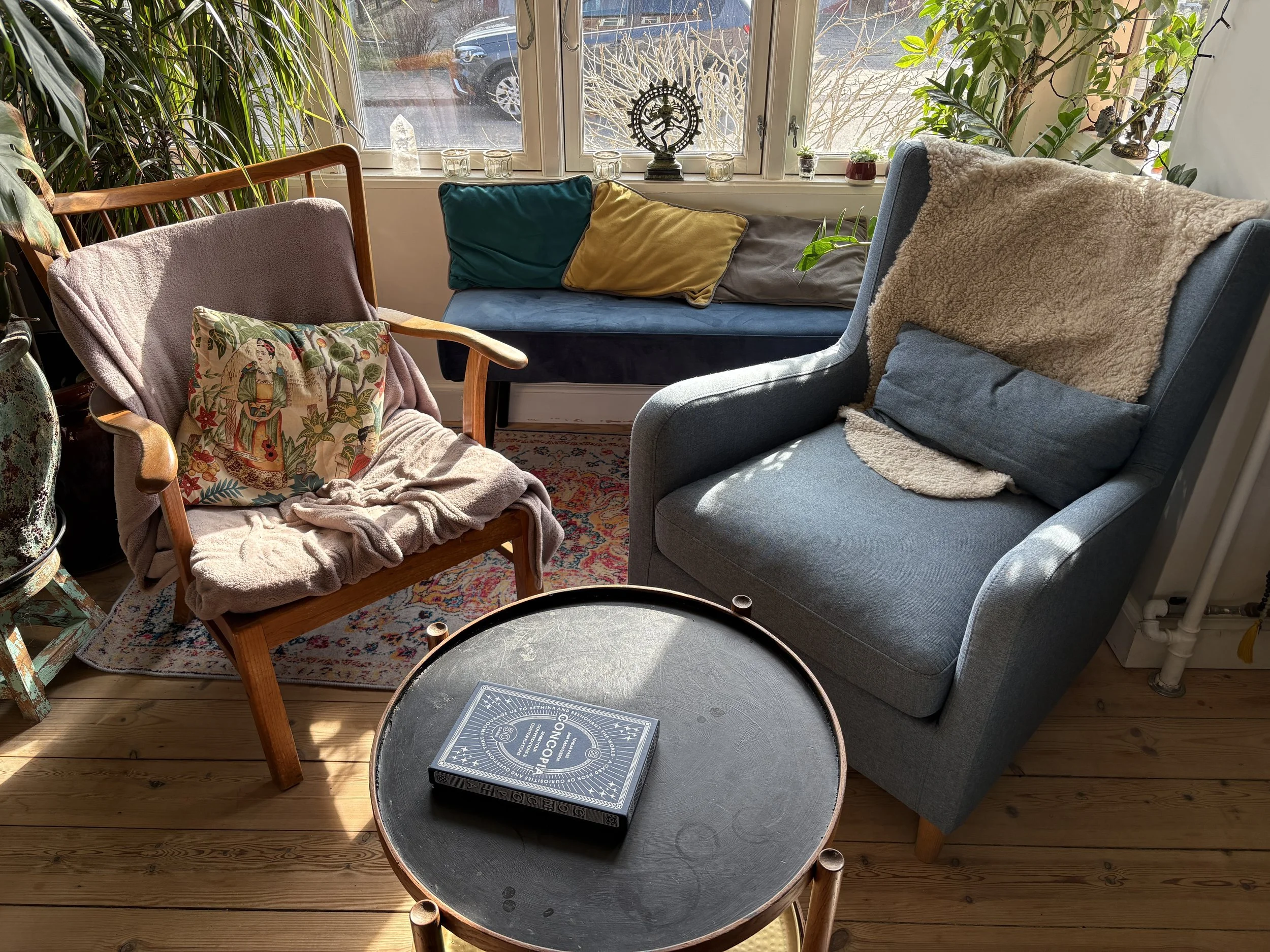The magic of the listening rounds
Over the past couple of months, I’ve been hosting a series of Microsalons on Hope & Despair in various parts of Denmark. It’s been quite a journey.
On a personal level, it has boosted my hope for the world—and my sense of agency—to crisscross the country, meet so many interesting people, and learn about their inspiring ideas and efforts. It’s also been truly enchanting to visit so many beautiful corners of Denmark and experience the many varieties of hyggein people’s homes.
On a more professional level, I’ve learned a great deal about the power of conversation, group dynamics, and deep listening—just by quietly eavesdropping on the 15 groups. And there is one particular aspect of Concopia that never ceases to amaze me: the magic of the listening rounds.
Everyone is free to use the Concopia Cards however they like. They’re very intuitive to use and tweak in numerous ways.
However, my absolute favorite way to use Concopia Cards is to divide the guests into groups of 4-6 people and start out with at least two listening rounds, where the cards function like a talking stick.
First of all: Make sure the groups don’t begin with traditional introduction rounds focused on basic small-talk points like job titles or professional backgrounds. It tends to feel stale and eats up precious time. Participants are, of course, welcome to share insights from their work or field while responding to the Concopia Cards—it’s not meant to be a secret. But when these details emerge as part of a response to an unexpected Concopian prompt, they come across as much fresher and more engaging—both for the group and for the person sharing.
Then get the listening rounds going: Each participant draws a card and responds to one of the prompts on it, speaking for about three minutes without interruption. The others simply listen—no comments, no follow-ups. Then the next participant draws a new card and does the same. And so it goes until everyone has spoken to at least two cards.
Don’t worry: At first, most people find this a little awkward. We’re so used to responding immediately—it can feel strange not to say anything at all. If someone challenges the rule and asks if they can’t just carry on a normal conversation simply tell them that in the future they are welcome to use Concopia Cards in whichever way they prefer - but for now this is an experiment and training session exploring deep listening.
After a while, most participants end up loving it. For several reasons:
Concentration:
Once you surrender to the listening rule, you stop focusing on all the clever points you could be making and begin listening more deeply to the person actually speaking. Also, by not responding out loud, each participant has more space to connect the dots in their own way—often sparking new ideas and lighting up the imagination in unexpected ways.
A container for respectful divergence:
In these times, when many of us struggle to stay in conversation with those we disagree with, there's something powerful about simply listening. We get to understand why others might think, vote, or prioritize the way they do. We don’t have to agree—but we can gain deeper insight into one another. And people tend to share more vulnerable, nuanced thoughts when they know no one will immediately jump in to challenge them.
Deeper points emerge:
While eavesdropping on the groups, I’ve noticed that our first responses are rarely the most interesting ones. The deeper insights often surface after a minute or two of uninterrupted speaking. It's fascinating how seldom we hear—or even think—those deeper thoughts through, simply because we're usually interrupted too soon.
Room for more voices:
Using the cards as a talking stick also ensures that everyone gets to participate. Without a simple structure like this, a few voices often dominate—not because they have more to say, but because they feel more comfortable speaking. This way, everyone has a turn. It’s beautiful to witness what happens when quieter participants are given space to share something meaningful—and when the more talkative ones realize how much they’ve been missing by not making space in everyday conversation.
Enhanced cross-pollination:
On a very practical level, the listening rule allows groups to explore more Concopia Cards. If everyone responded to each speaker, most groups would only get through a handful of cards—since any one of them could spark an hour-long conversation. But the real magic of Concopia Cards happens in the mix—across categories that range from grand civic desires and tiny everyday enchantments, to the revival of endangered skills, the wonders of nature, and the pivotal people in our lives.
And then—after the initial two listening rounds—something truly lovely happens: once everyone is allowed to speak and comment again the conversations tend to explode. Everyone has spoken and shared something intriguing, the others long to dive deeper into or follow up on. And everyone feels grateful for the new ideas that have emerged while listening to each other - creating a surprisingly strong bond.
If you haven’t tried it yet, I highly recommend casting this Concopian spell on your conversations.




